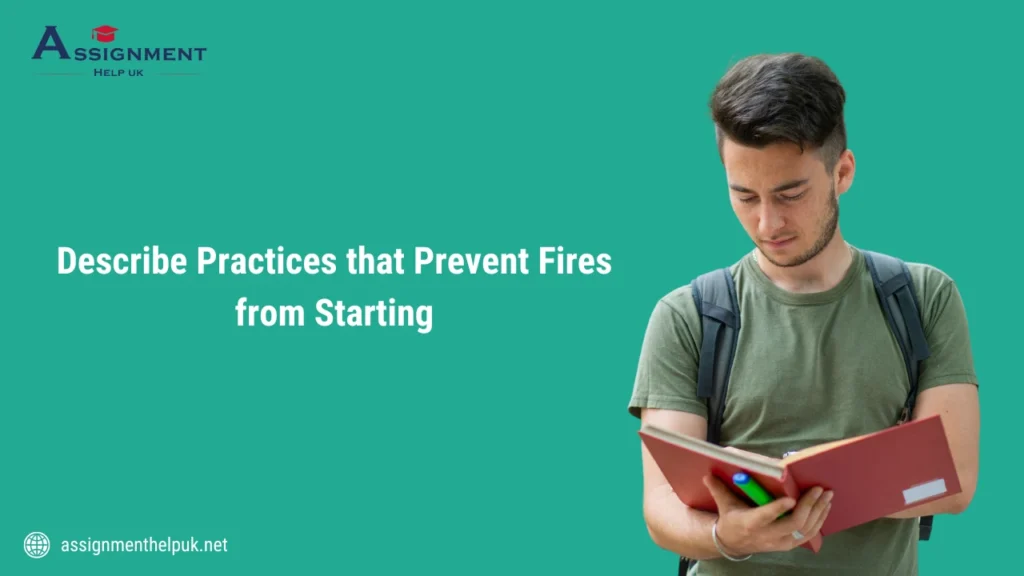Describe Practices that Prevent Fires from Starting

You must know of fire safety precautions so you can describe practices that prevent fires from starting. Fires can cause pain such as damage, injury, and death. An employee must know enough about flammable materials in care settings to prevent fire when it breaks out. Keep this trio in mind as these three elements make a chemical reaction. Remove either of the three and you can prevent a fire from starting and spreading.
How to Stop the Fire From Starting?
Following are the practical solutions for spreading fire:
- Keep the use of portable heaters limited.
- Supervise those who are new to cooking.
- Food cooking must always be attended to. Make sure you are always there when food is cooking.
- Waste must be kept away from heat sources.
- Naked flames should be used only when it is important.
- Faulty equipment must never be used until faults are reported and the equipment is reported.
- Electrical equipment should be unplugged when not in use.
- Keep fire extinguishers around and use flammable material as minimum as possible; unneeded items must be removed.
- Your workplace should be clean and tidy; waste and rubbish should not be around sources of fire.
- Keep flammable stored in the right places. Flammable substances and ignition sources must be kept apart.
How to Stop the Fire From Spreading?
You should be able to describe practices that prevent fire from spreading. The following are some possibilities:
- Fire exit signs and evacuation routes must be clear.
- Fire drills must be conducted regularly.
- Employees must adopt and follow the agreed ways of working.
Practices that Prevent Fires from Starting and Spreading
A social care employee should be aware of practices that prevent fires from starting and spreading. Those who are pursuing a Level 3 Diploma must show how fire prevention is a vital measure of social and health care. Every RQF Level 3 student should be aware of fire hazards and materials that can be ignited. Additionally, you should know about events of a fire cause, escape routes, sprinkler systems, and ways to prevent fire once it begins. At your level, you should help prevent the spread of fire through regular fire drills.
Involve your assessor, colleague, or manager to form a good working order. It’s easy to forget important tips about fire-resistant materials; handling information in care settings can be a chore. Once you collaborate with others, you can have the tips burned in your memory.
What Happens If You Don’t Know of Fire Prevention Practices?
Suppose there is a fire in your home. Preventing it from spreading requires knowledge. If you do not have this knowledge in accuracy – along with the storage of flammable materials – and regular maintenance of those materials. You must be aware of safe cooking practices and fire safety training. Make sure that nothing is overheating. In the case of a fire, overheating is often the main aspect. Conduct regular fire drills and learn the use of fire extinguishers. Prevent overheating and remove anything that contains fire elements whenever no longer needed.
Fire starts when you do not assess the risk of fire incidents. Regularly inspect and maintain stuff like curtains, rugs, and overheating stoves. You must know of fire-resistant materials in building construction and you should have enough time to evacuate before serious fire spreads.
Use study guides to learn about things that ignite a fire. The installation of sprinkler systems is advantageous and makes sure that doors are designed in a way that reduces the risk of spreading fire. Ensuring the safety, understanding and implementing of safety measures that should withstand high temperatures.
Evacuate as soon as possible once the fire starts and reduce elements that contribute to fire materials. Conduct regular checks and keep escape routes clear. Make sure emergency responses are well-conducted. The time for evacuation is short so evacuation procedures must be easy.
Related Samples
Top Grades Guarrantied




